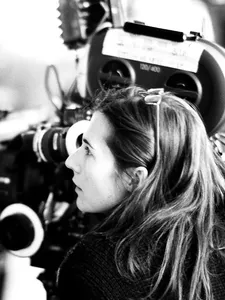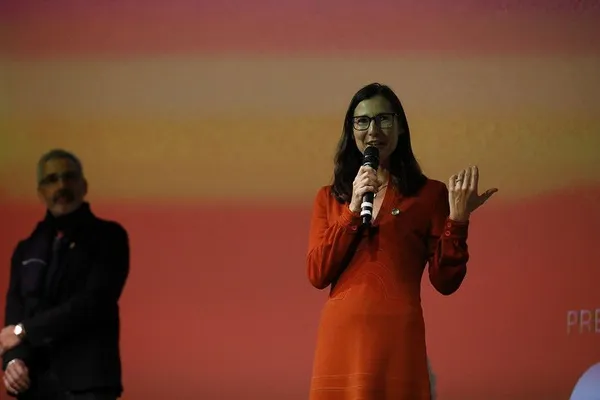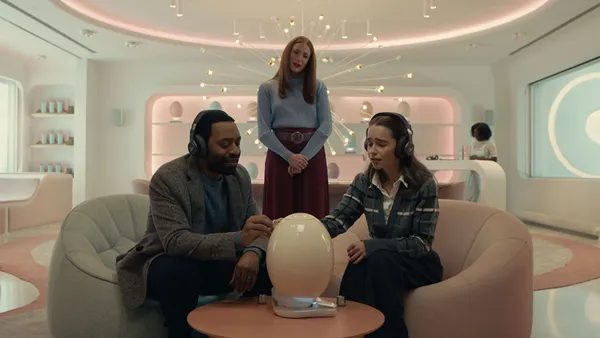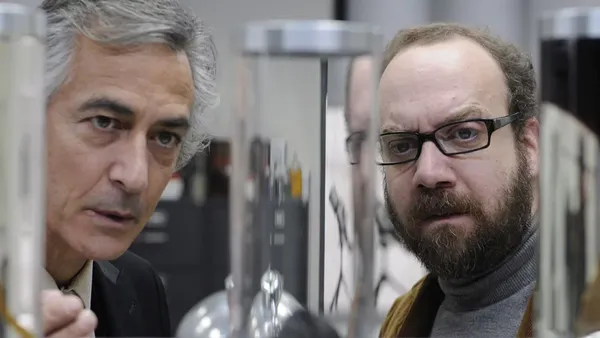The Pod Generation - which had its world premiere at Sundance last month, sees French-American director Sophie Barthes return to scrutinising an imagined near-future, as she did in her debut Cold Souls. This time around it’s giving birth that has been outsourced but as Rachel (Emilia Clarke) and her retro-loving husband Alvy (Chiwetel Eijiofor) prepare to become a mum and dad courtesy of a pastel-coloured pod, they find things are quite as simple as they first appear.
The film – which picked up the Alfred P Sloan award at Sundane for its use of science – touches on everything from pressures on would-be mums in the workplace to the way tech firms often make their products look organic in a bid to win us over. In the first part of our interview with the director, she told us about her influences and why she believes the science-fiction of the near-future is closer than we think.
“I love this idea of exploring the future because we can explore philosophical questions in a playful way,” she says. “I think it's a great genre, but the sci-fi I'm making is not like the male, very angular, muscular, testosterone-driven sci-fi – so I don't know how to describe it. I think it's more maybe a cautionary tale or a fable. It has elements of fable.”
The director also doesn’t pull her punches when it comes to hitting out at what filmmakers should and shouldn’t be allowed to talk about.
 |
| Director Sophie Barthes: 'I think the film has become more and more a documentary about where we are going in the next few years' Photo: Courtesy of Sundance Institute |
“I know you can't say the word any more – it's forbidden in America – but I love Woody Allen. If you say Woody Allen or Polanski nowadays, you get a glare and then no one wants to talk to you any more. But I am French, so I tend to separate the artist from the person. I think we cannot disregard Allen’s influence on filmmaking and I love his early ones.
“The debate has become so silly in the US that it's really hard as a filmmaker. It seems you can only talk about yourself now. But if you talk about yourself like Alejandro Iñárritu did with Bardot you get slammed because you're narcissistic. So it's tricky.”
Barthes says her favourite humourist was Frenchman Pierre Desproges, who died of cancer in 1988.
She explains: “He said, ‘You can laugh about everything, but not with everyone’. And for me, the early Woody Allen, like Everything You Always Wanted To Know About Sex *But Were Afraid To Ask, Sleeper, Bananas – all those comedies that you could say are silly, but they're not silly. They're asking questions about humanity just in a playful way.
“I think that's the style and the genre I love. I love Luis Buñuel also, who I think was much more satiric but he was also exploring themes that are about where society is heading? More than a film about the future, I think, as I was writing, the film has become more and more a documentary about where we are going in the next few years.”
Barthes says that when she began writing the film four years ago, artificial intelligence tool ChatGPT - an OpenAI chatbot that creates content as it reacts with users in a conversational way, didn't exist yet. It’s a similar idea to the artificial intelligence that crops up in the film - with Rachel's work day and life monitored by a cute-looking eye on a stalk. She also has Alvy and Rachel consult an AI therapist at one point, something she said has now been studied at Stanford. Amusingly, the real-life item is called a Woebot, which you can read about it here.
Barthes notes: “The students have said that they feel more comfortable talking to the machine than a human being because they don't feel judged. So I was talking to Doron Weber, at the Sloan Foundation, which awarded the movie a prize, and he was saying, in a few years, we're going to look back and say, ‘We've been warned that this technology was coming to us, and we don't want to look at the immediate implications’.”
Barthes also praises Netflix movie Don’t Look Up, directed by Adam McKay.
She adds: “If you live in the US, it's a society of denial. So as long as we can consume, and be, you know, glued to content, we're happy, but when it’s put in front of us, we realiee this is the society we're building. And no one likes to look at it.”
The director says she firmly believes that a lot of the fictionalised science in her film – including the idea that foetuses could be grown in pods – is going to become a reality.
“You're going to see in 10 years, we're going to have pods,” she says. “It's going to happen. I read an article just as I was finishing the film that some scientists in Israel were able to grow a mouse in an artificial synthetic womb. Also because the money is going to come in. I don't know if you've seen there are some Twitter exchanges between Elon Musk and some hi- tech guy like last year. Elon Musk was very worried there is a decline in population in the First World [You can read his tweets here]. I don't know if you've seen recently Japan, Italy and even the US have a decline in fertility and birth.
Barthes adds: “He was very worried that if there are not enough humans for the planet, there are not going to be enough humans to populate Mars. This was this concern. This sounds like science-fiction but these are very important people saying those things. And then a hi-tech person answered yes, this is a real problem, we need to find a solution to this. And the cheapest fastest way to manufacture babies is to have synthetic wombs. So if those people that have that much power are saying this it is not a joke, actually, this is happening.
“So for me, the film is very much like Don't Look Up, it's a cautionary tale. This technology is going to happen. What are we going to do about it? It's incomprehensible how fast the progress is going right now with artificial intelligence. We have not asked ourselves the ethical and philosophical questions. For me, the film is a political statement made as a satire and comedy, so at least we can laugh about it, instead of crying.”
She’s certainly right about the speed of technology. Even this interview was transcribed with the help of artificial intelligence - Otter.ai, which I have to admit saves me hours every month. But for all the laughter in Barthes' film – and it has plenty of observational humour about everything from baby slings to life pressures – she has a serious point to make.
She adds: “For me, it's a very desperate message. I have a 13-year- old, I see where society is going. Right now, raising a kid in New York feels like raising a consumer. The Social Dilemma documentary said that. You're not an end by yourself, you're a means to get the content in your head and to be a provider of your data to those companies. That's what it is. If we are blind to it, because they enjoy the convenience of progress and how great it is to be glued to a little device seven hours a day, great, but I don't think it's gonna make a very healthy society.
“The uterus, the pod in the movie is an allegory. It’s a symbol of how absurd things have become. And throughout the film, you see Alvy, the father, carrying this pod, like it's a rugby ball, it just became an object. This is what commodification of humanity, of the womb is going to become. Everything is a product, everything is for sale, everything is convenient and it looks so happy and great and seductive. But if you think of the implications, it's extremely sad and worrisome that a very few people have that much power over humanity and are taking all the decisions.
“If you read all the articles about ChatGPT, this week, they're saying all the money in artificial intelligence is invested the wrong way. Because artificial intelligence, per se, could be incredible. It could really help us to solve climate change issues to solve cancer issues. But it's never going to be used for the right reasons. It's going to be used for a very few people to make more profits and use humanity as a commodity. So that's my very political take on it.”
The word seductive is an interesting one and one that Barthes puts to good use in the film as her future world blends the organic-looking and the hi-tech together, for example, in Rachel’s AI that looks like an eye. But Barthes also highlights the way that people in the universe she has created have almost become more afraid of the real deal than the ersatz, manufactured equivalent. This is most apparent when Alvi tries to get some students to eat real fruit from a tree and they look scandalised.
Again, Barthes notes there’s truth behind the fiction as the story came to her from a scientist who had something similar happen to him.
 |
| Sophie Barthes at the Sundance premiere Q&A Photo: Jen Fairchild/courtesy Sundance Institute |
“Talking about this being a documentary, this scene happened,” she says. “I met a botanist, who inspired the character of Alvy, Ari Novy. He was the head of the Washington Botanic Gardens and now he's in San Diego. He’s an incredible botanist. He told me the story that he took his botanist students on a field trip in Italy and they would not try a fig from the tree, because they thought they thought it was toxic, because it was coming from nature. They were used to figs under cellophane that felt safer, because they're manufactured somehow. This for him was an incredible moment of thinking, those kids are studying botany and they want to work with nature and they have zero contact with nature. They're afraid of nature, because nature has been commodified.
“And our relationship, when you live in New York, or London, or like big cities, it's so remote. That, I think, is the issue with climate change. How are we going to take care of nature if we don't know nature. You can only take care of something that you love, because we've been in contact with it and you develop a relationship with it. But because we're so disconnected, and our kids are on screens all the time or spending time indoors, I think in New York, kids spend more time indoors than maximum security prisoners in jails, they're, on average, spending one hour per day outside.”
The director points out we’re supposed to spend time in nature and “contemplate” it because that’s the way we are wired.
“We don't have time for that,” she says “All we're doing is regurgitating content. I'm part of it too, I read three hours of news about the war in Ukraine every day but that's what we are becoming, recipients of digital content. I think the companies that are developing technology are going to try to blur the line between the organic and the digital so it becomes extremely confusing and you're not sure any more, what you have in front of you. It's seductive, because you feel, you know, it's something we've created, but it's also strangely more powerful than us. And so I think, you know, the film was about showing that those tools that we've created, have enslaved us instead of becoming tools. And that's why in the film at one point there is a screwdriver. It's a symbol of a tool. That's what a tool is for, it's a tool that you could put aside when you don't need it. The other tools we've created, artificial intelligence, we cannot put them in a box any more and say, ‘Oh, today, I don't need the tool’. We’ve become slaves to it.”
Read the second part of our interview with Sophie Barthes, about the feminist production design of the film and its inspiration, plus working with her cinematographer husband and her next project.























